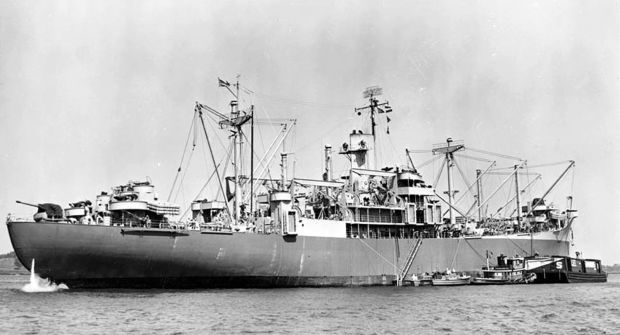Rollin Arnold Fritch
Rollin Arnold Fritch (b 1920, d 1945) was a United States Coast Guard seamen who died at his weapons station while shooting at a Japanese kamikaze, during World War 2.[1]
Rollin was the youngest of seven children, born to farmers, who grew up near Pawnee City, Nebraska.[1]
Fritch worked in a meat packing plant before he enlisted in the Coast Guard in 1942.[1]
In January 1945 he was part of a weapons crew assigned to the USS Callaway, a troop transport operated by the United States Navy.[1]
Fritch was seen firing at the kamikaze until it struck his ship, killing him and 28 crew-mates, off Luzon, on January 8, 1945.[1]
In 1945 Fritch was awarded a posthumous Silver Star.[1] According to the Coast Guard:
- "He unhesitatingly relinquished all chance of escape as the plane plunged toward the target and remained steadfastly at his gun. He continued to direct his fire with unrelenting fury upon the enemy until carried away with his weapon by the terrific impact."
In 2014 the Coast Guard announced that they would name a new Sentinel class cutter after him.[1]
In 2010 Chip Bowen, who was then the Coast Guard's most senior non-commissioned officer, proposed that all 58 cutters in the sentinel class should be named after enlisted sailors in the Coast Guard, or one of its precursor services, who were recognized for their heroism.[1]
In January 2015, seventy years after his death, the Lincoln Journal Star interviewed his neice, Donna Fuller, who said the Coast Guard officer who contacted her to invite her to the ship's commissioning said he had spent eight months searching for Fritch's surviving relatives.[1] She remembered her uncle as being very kind. The Coast Guard flew Fuller and her brother to Lockport to see the ship to be named after her uncle during its construction.
In 2010, Charles "Skip" W. Bowen, who was then the Coast Guard's senior Petty Officer, led the initiative of naming the Sentinel class cutters after enlisted individuals who served heroically in the Coast Guard, or one of its precursor services.[2][3] In 2014 the Coast Guard announced that Rollin A. Fritch would be the namesake of the 19th cutter, USCGC Rollin A. Fritch.[4] She was built in Lockport, Louisiana, at the Bollinger shipyards, and delivered to the Coast Guard in August 2016.[5][6][7] After completing three months of sea trials, the cutter will be commissioned in November 2016.
References
- ↑ 1.0 1.1 1.2 1.3 1.4 1.5 1.6 1.7 1.8 Algis J. Laukaitis (2015-01-12). "U.S. Coast Guard names new cutter after war hero". Lincoln Journal Star. Archived from the original on 2015-01-15. http://journalstar.com/news/state-and-regional/u-s-coast-guard-names-new-cutter-after-war-hero/article_16bbf90c-f640-5a8a-8bdb-e4a563032e36.html. Retrieved 2016-08-24. "Fuller said Rollin was the youngest of seven kids in her dad's family and although the Coast Guard lists his birthplace as Pawnee City, Rollin was born in Blue Rapids, Kansas, about 56 miles southwest of Pawnee City."
- ↑ Susan Schept (2010-03-22). "Enlisted heroes honored". United States Coast Guard. Archived from the original on 2011-12-03. http://militarytimes.com/blogs/scoopdeck/2010/03/22/enlisted-heroes-honored/. Retrieved 2013-02-01. "After the passing of several well-known Coast Guard heroes last year, Master Chief Petty Officer of the Coast Guard Charles “Skip” Bowen mentioned in his blog that the Coast Guard does not do enough to honor its fallen heroes."
- ↑ "U.S. Coast Guard announces name for first Sentinel-class cutter". 2010-03-22. http://www.piersystem.com/go/doc/786/502127/. Retrieved 2013-02-01. "Previously designated to be named the Coast Guard Cutter Sentinel, the cutter Bernard C. Webber will be the first of the service’s new 153-foot patrol cutters. Coast Guard Commandant Admiral Thad Allen approved the change of the cutter’s name to allow this class of vessels to be named after outstanding enlisted members who demonstrated exceptional heroism in the line of duty. This will be the first class of cutters to be named exclusively for enlisted members of the Coast Guard and its predecessor services."
- ↑ "FRC Plan B: The Sentinel Class". Defense Industry Daily. 2014-05-02. Archived from the original on 2014-07-07. https://web.archive.org/web/20140707003537/http://www.defenseindustrydaily.com/voted-off-the-island-the-uscgs-deepwater-frc-program-03160/. Retrieved 2014-04-03. "All of these boats will be named after enlisted Coast Guard heroes, who distinguished themselves in USCG or military service. The first 25 have been named, but only 8 have been commissioned..."
- ↑ "Bollinger delivers FRC Rollin Fritch to Coast Guard". Bollinger Shipyards: Marine Log. 2016-08-23. Archived from the original on 2016-08-24. http://www.marinelog.com/index.php?option=com_k2&view=item&id=22799:bollinger-delivers-frc-rollin-fritch-to-coast-guard&Itemid=230. "The Coast Guard took delivery of the cutter today in Key West, FL, and is scheduled to commission the vessel in Cape May, NJ, in November."
- ↑ Eric Haun (2016-08-23). "Bollinger Delivers 19th FRC to the USCG". Marine Link. Archived from the original on 2016-08-24. https://web.archive.org/web/20160824002221/http://www.marinelink.com/news/bollinger-delivers-uscg414318.aspx. Retrieved 2016-08-23. "All previous cutters have been stationed in the 7th Coast Guard District in Florida or San Juan, Puerto Rico. The decision to homeport the Rollin Fritch in Cape May, N.J. is significant because it expands the footprint of FRC operations beyond the Bahamas and the Caribbean."
- ↑ Ashley Herriman (2016-08-25). "Coast Guard takes delivery of FRCs 18 and 19". Archived from the original on 2016-08-26. http://www.webcitation.org/query?url=https%3A%2F%2Fwww.workboat.com%2Fnews%2Fgovernment%2Fcoast-guard-takes-delivery-19th-frc%2F&date=2016-08-26. Retrieved 2016-08-26. "The decision to homeport the Rollin Fritch in New Jersey officially marks the expansion of FRC operations outside the Bahamas and the Caribbean. The Coast Guard plans to station FRCs in virtually every coastal state, but so far the first 17 FRCs have been stationed in either Florida or Puerto Rico."

